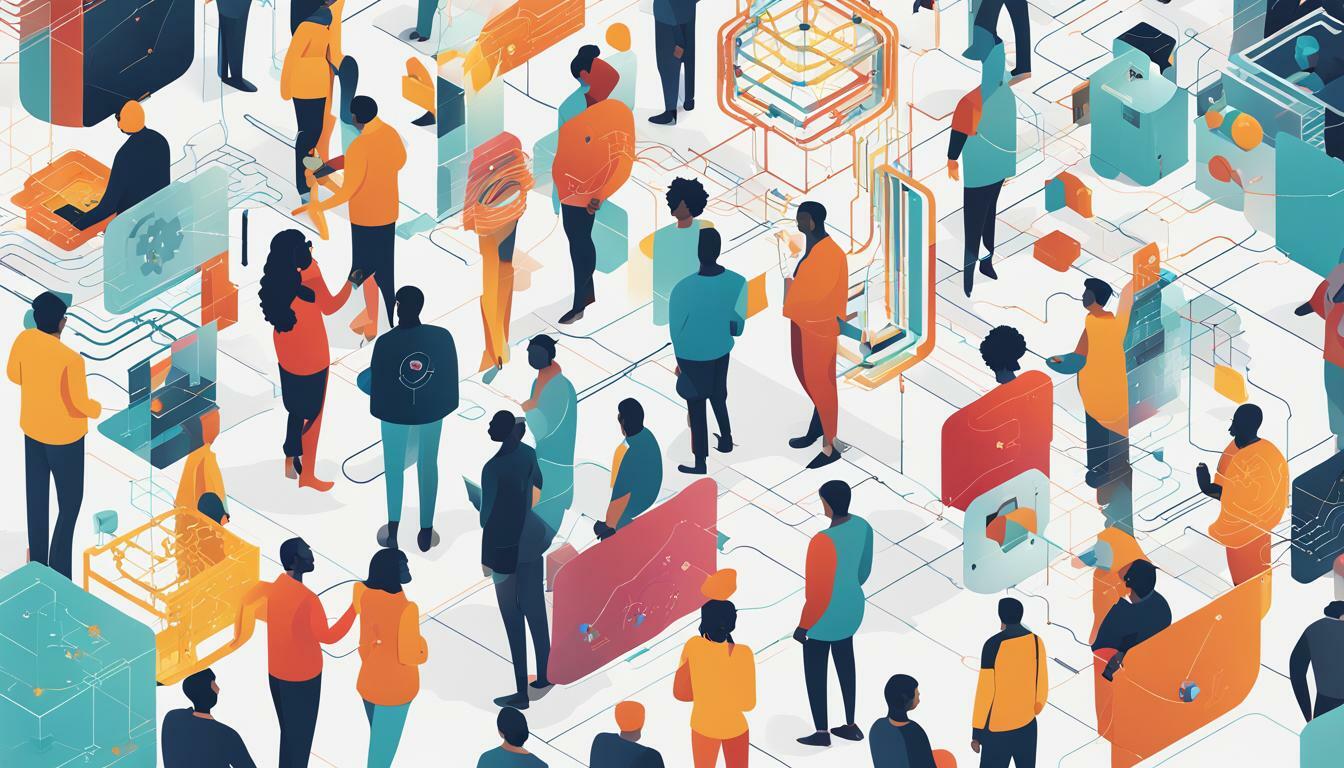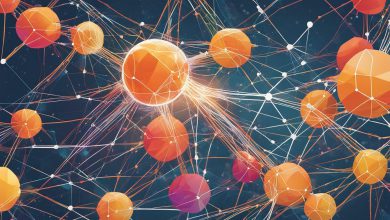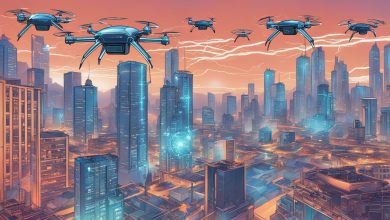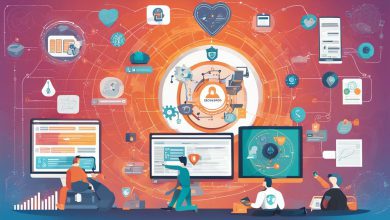
Artificial Intelligence (AI) has become a buzzword in tech and business circles alike – and for good reason. AI technologies are transforming the way we live and work, from personalized recommendations on streaming services to intelligent fraud detection in banking. However, the development and implementation of AI has been traditionally limited to those with specialized expertise in data science and machine learning. This has led to a lack of diversity and accessibility in the AI field – but that’s where democratizing AI comes in.
Democratizing AI involves making advanced technology accessible to a wider audience by providing tools and platforms that enable developers of all skill levels to build intelligent systems. Democratizing AI is not just about creating more inclusive access to technology; it is also about improving the quality of AI outcomes. By empowering a diverse group of developers to create and deploy AI, we can ensure that AI reflects a broader range of perspectives and experiences.
Key Takeaways:
- Democratizing AI involves making advanced technology accessible to a wider audience through tools and platforms.
- Democratizing AI leads to more inclusive access to technology and improved quality of AI outcomes.
- Empowering a diverse group of developers to create and deploy AI ensures AI reflects a broader range of perspectives and experiences.
Understanding the Democratization of AI
As AI technologies continue to advance, democratization of machine learning and AI accessible platforms have become increasingly important in making this advanced technology accessible to a wider audience. With the democratization of AI, developers of all skill levels and backgrounds are able to incorporate AI into their applications without needing extensive knowledge of data science or machine learning.
The democratization of machine learning has paved the way for accessible AI platforms, making AI more accessible than ever before. These platforms typically offer user-friendly interfaces, pre-built models, and other tools designed to simplify the integration of AI into any project.
Thanks to the democratization of advanced technology, AI is no longer just for large corporations with significant resources. Any individual or organization can utilize AI to gain a competitive edge and improve operations. Furthermore, democratizing AI technologies can help drive innovation in various industries and lead to the creation of new products and services.
Tools for Democratizing AI
Democratizing AI means making advanced technology accessible to everyone, including those without expertise in data science. To achieve this goal, several user-friendly AI tools have been developed to help developers incorporate AI into their projects easily.
Different AI tools are available to suit various needs, ranging from drag-and-drop interfaces to code-based platforms. These tools allow developers to create intelligent systems without the need for extensive knowledge of algorithms, machine learning, or coding. As a result, democratizing data science has become easier, and the days when building AI-based systems were exclusive to a select few are long gone.
One example of accessible AI solutions is Tensorflow, an open-source library for machine learning. Tensorflow allows developers to build and train machine learning models with ease using its graphical user interface. Another AI tool that has gained popularity is Hugging Face, which provides different pre-trained models for natural language processing (NLP) tasks, saving developers valuable time. Additionally, Dialogflow, a conversational AI platform, enables developers to create chatbots and voice assistants without the need for coding experience.
Overall, these AI tools for everyone are making it easier for all developers to create intelligent systems regardless of their experience level. They have democratized data science, making it more accessible and inclusive, and have significantly contributed to driving the adoption of AI technologies.
Platforms for Democratizing AI
Platforms are playing a crucial role in democratizing AI technologies, making them more accessible to developers of all skill levels and backgrounds. These platforms provide user-friendly interfaces and pre-built models that simplify the process of integrating AI into their applications.
One such platform is Google’s AutoML, which allows developers to build custom machine learning models with limited expertise and resources. The platform uses a drag-and-drop interface that makes it easy for even novice developers to create high-quality models.
Another platform that’s been gaining popularity is Hugging Face, an open-source developer-focused platform that provides pre-trained models and training scripts for natural language processing. It’s designed to be easily accessible and provides extensive documentation, a community forum, and sample code, making it easier for developers to experiment with AI.
Microsoft’s Azure Cognitive Services is another popular platform that provides pre-built AI models for various use cases, ranging from computer vision to speech recognition.
Challenges in Democratizing AI
While these platforms have made significant strides in democratizing AI, some challenges still need to be addressed. One of the key challenges is ensuring that the democratization of machine learning doesn’t compromise accuracy or reliability. It’s crucial to maintain high standards of accuracy, even as AI tools become more accessible to a wider audience.
Another challenge is ensuring that AI is developed ethically, with transparency and fairness in mind. AI accessible platforms must be designed to avoid perpetuating biases, and developers need to be aware of the potential negative implications of their work.
Overcoming these challenges is critical to ensuring that AI democratization is carried out in a responsible and ethical manner, leading to further innovative developments.
Overcoming Challenges in Democratizing AI
While the democratization of machine learning and AI accessible platforms have made AI more accessible to a wider audience, there are still challenges that need to be addressed. One of the key challenges is ensuring that the democratization of machine learning does not compromise accuracy or reliability. As AI becomes more accessible, it is important to ensure that the models developed are robust and accurate.
Another challenge in democratizing AI is maintaining ethical standards and transparency. With algorithms being used to make decisions that impact people’s lives, it is crucial that they are developed and deployed in an ethical and transparent way. This includes ensuring that bias is minimized and that decisions made by AI systems are explainable and understandable.
Lastly, the democratization of AI also raises questions about the potential impact on employment. As AI becomes more accessible, there is concern that it will replace human workers. It is important to consider how the democratization of AI can be used to support and enhance human workers, rather than replacing them.
Future Implications of Democratizing AI
The democratization of AI is expected to have far-reaching implications for the future of technology and society as a whole. By increasing accessibility to AI, democratizing advanced technology will drive innovation in various industries and transform the way we live and work.
With AI tools for everyone and AI accessible platforms, individuals and organizations of all sizes will have the ability to leverage the power of AI in their everyday operations. This will lead to increased efficiency, accuracy, and productivity, enabling businesses to maximize their potential and drive growth.
Furthermore, the democratization of AI will enable more individuals to participate in research and development of new technology. This will lead to increased diversity in AI development, allowing for a wider range of perspectives and approaches to be considered.
However, as with any major technological advancement, there are also potential risks and challenges that need to be addressed. As AI becomes more accessible, it is imperative to ensure that ethical standards and transparency are maintained throughout the development and deployment of AI systems.
Overall, the democratization of AI has the potential to revolutionize the way we live and work. It will open up new opportunities for innovation and growth while also increasing accessibility to advanced technology for individuals and organizations of all backgrounds.
Conclusion
The democratization of AI is a crucial step towards making advanced technology more accessible to everyone. Through the provision of tools and platforms for every developer to build intelligent systems, AI is becoming more available to individuals of all skill levels and backgrounds. The democratization of machine learning and the advent of AI accessible platforms have made significant advancements in the democratization of AI technologies.
The Future of Democratizing AI
As the democratization of advanced technology continues, we can expect to see an increase in innovation across various industries. The accessibility of AI tools for everyone and AI accessible platforms will drive the widespread adoption and utilization of AI technologies. However, we must also be mindful of the challenges that may arise in the process of democratizing AI. It is important to maintain ethical standards and ensure accuracy and reliability are not compromised.
Overall, the democratization of AI is an essential movement that seeks to make technology accessible to everyone. By providing accessible tools and platforms for every developer to build intelligent systems we are driving the widespread adoption and utilization of this advanced technology. It is up to us to continue to advance the democratization of machine learning and AI accessible platforms to ensure a brighter future for all.
FAQ
Q: What is the concept of democratizing AI?
A: Democratizing AI refers to the process of making artificial intelligence accessible to a wider audience by providing tools and platforms that enable developers of all skill levels to build intelligent systems.
Q: How has the democratization of AI advanced?
A: The democratization of AI has advanced through the democratization of machine learning and the creation of AI accessible platforms, which have made AI more available and approachable for developers.
Q: What tools are available for democratizing AI?
A: There are various tools designed to democratize AI, allowing developers to easily incorporate AI into their projects. These tools enable users, regardless of expertise, to leverage the power of AI in their applications.
Q: Which platforms are leading the charge in democratizing AI?
A: Several platforms are leading the way in democratizing AI by providing user-friendly interfaces and pre-built models. These platforms simplify the process of integrating AI into applications and contribute to the democratization of AI technologies.
Q: What challenges arise in the process of democratizing AI?
A: One challenge is ensuring that the democratization of machine learning does not compromise accuracy or reliability. It is also important to maintain ethical standards and transparency when developing AI accessible platforms.
Q: What are the future implications of democratizing AI?
A: Democratizing AI will drive innovation in various industries, with the potential to impact the development and adoption of AI. The availability of AI tools for everyone and AI accessible platforms will play a key role in shaping the future of AI.








